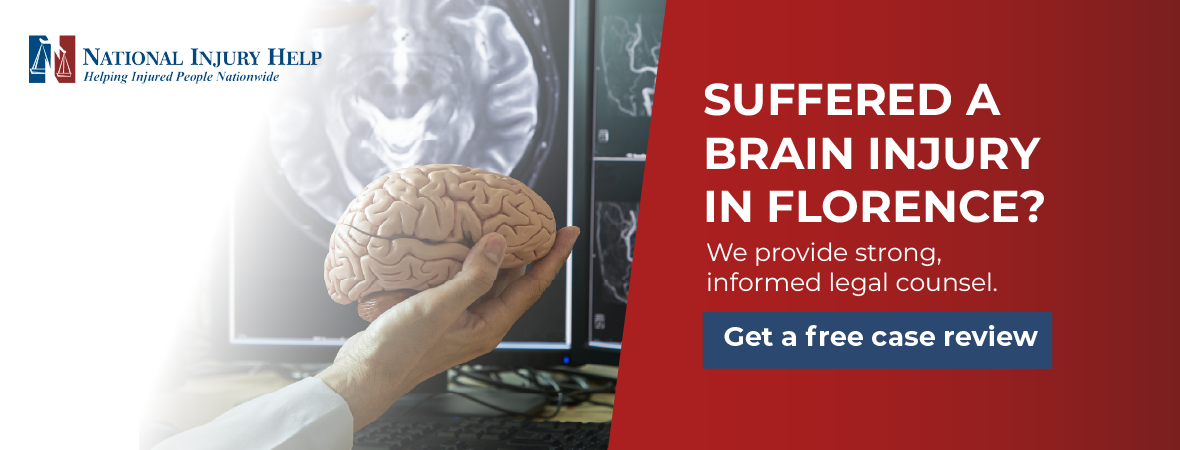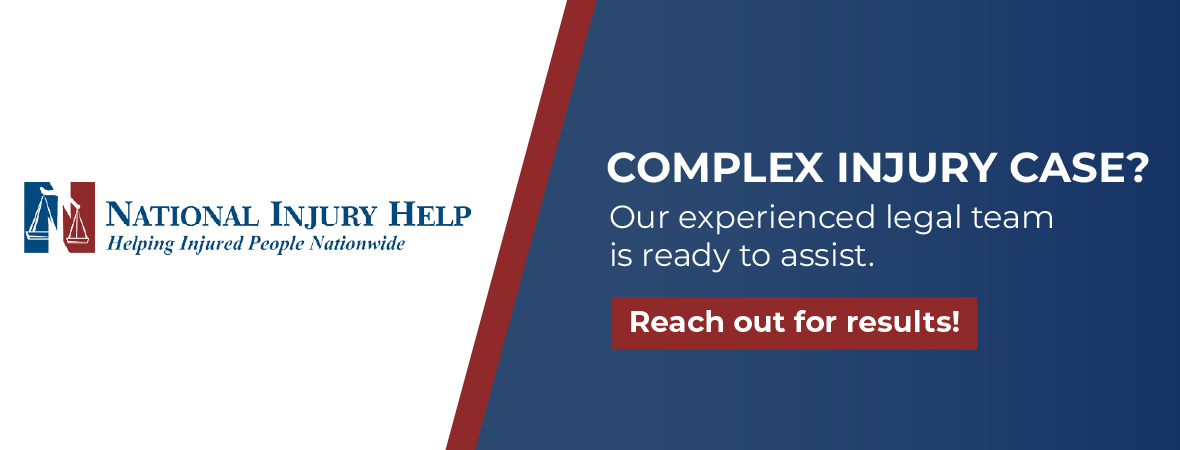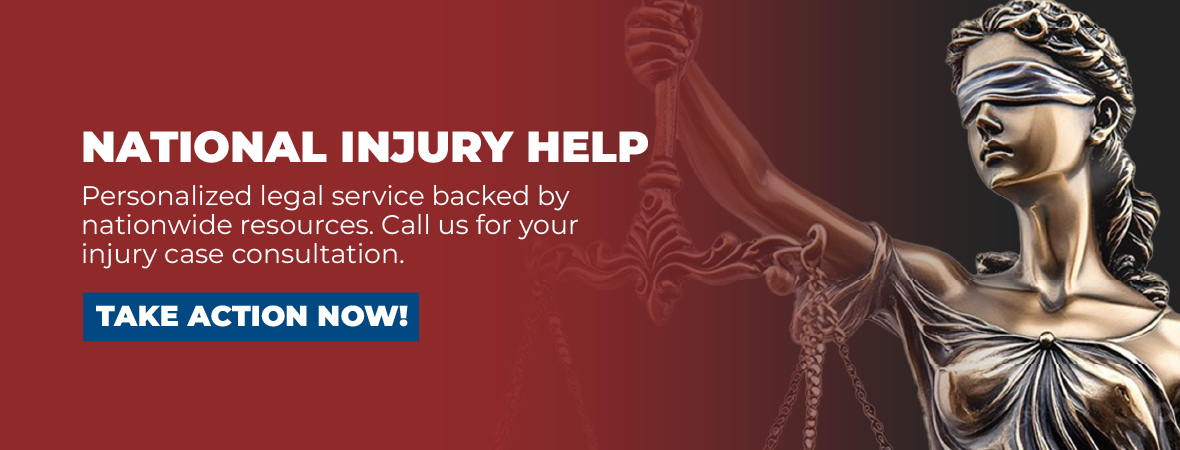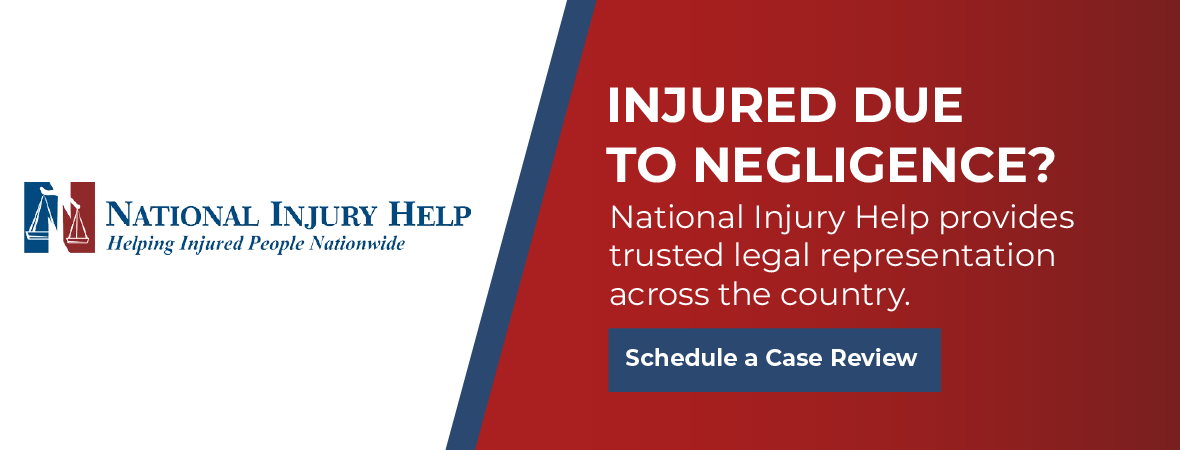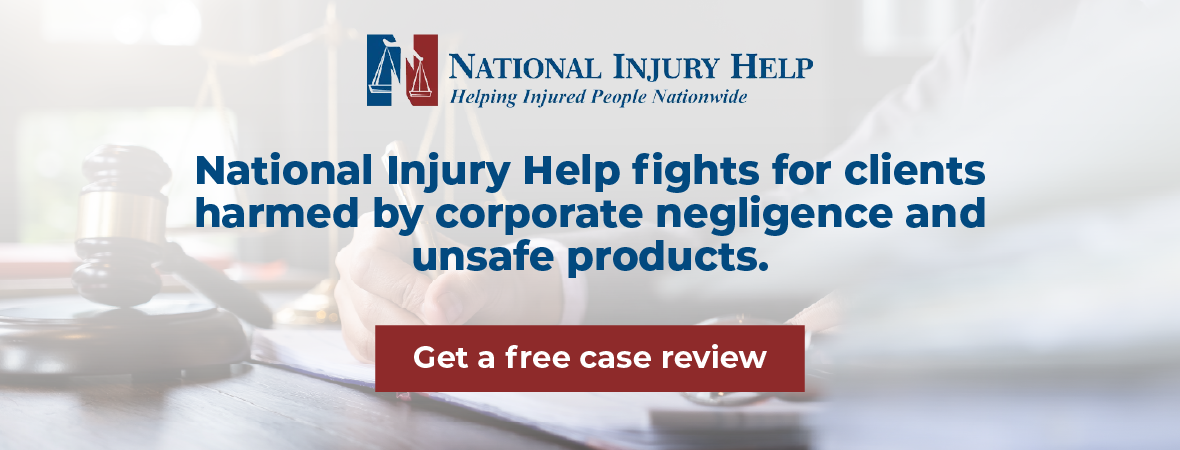Florence Brain Injury Attorney: Advocating for TBI Victims in Arizona
At National Injury Help, we connect you with top legal professionals across all 50 states, including experts in brain injury claims in Arizona. Call 1 (800) 214‑1010 for a free consultation today.
Traumatic brain injuries (TBIs) can be life-changing, affecting not just physical health but cognitive function, emotions, and long-term quality of life. If you or a loved one has suffered head trauma in Florence, Arizona, you need a dedicated Florence brain injury attorney who understands the complexities of TBI cases and can fight for full compensation.
Understanding Traumatic Brain Injuries (TBI)
A traumatic brain injury (TBI) is not always immediately obvious, but its effects can ripple across every part of a person’s life. Whether classified as mild, moderate, or severe, a TBI requires more than medical care; it demands careful attention to how the injury affects the victim’s mind, emotions, and future.
How TBIs Manifest Beneath the Surface
- Cognitive disruptions
Difficulty focusing, forgetfulness, and slower processing speed can interfere with daily tasks and decision-making. - Emotional and psychological shifts
Victims may experience anxiety, irritability, depression, or emotional volatility, often without understanding why. - Sleep disturbances
Many people with TBIs develop insomnia, hypersomnia, or frequent waking that compounds other symptoms. - Sensory and perceptual changes
Some report sensitivity to light or sound, double vision, or difficulty processing visual or spatial information. - Communication issues
Trouble finding words, following conversations, or understanding abstract language can make social situations frustrating.
The Diagnostic Process Matters
A proper diagnosis isn’t just about identifying a concussion. It often involves:
- Neuroimaging tests, like MRIs or CT scans, are used to detect structural damage
- Neuropsychological evaluations to measure attention, memory, and executive function
- Functional assessments to determine how the injury affects daily life and work ability
These evaluations are key in building a solid legal claim; your medical records and expert interpretations form the foundation of your case.
Why Legal Support Is Critical in This Process
A seasoned Florence brain injury attorney understands that insurance companies may downplay a TBI if symptoms aren’t visibly dramatic. But the invisible toll (on your career, relationships, and mental health) can be just as devastating. Legal counsel can ensure:
- Every aspect of your injury is thoroughly documented
- Long-term care and future accommodations are factored into your claim
- You’re connected with expert witnesses if needed to explain your condition to a jury
The complexity of brain injuries means no two cases are alike, and your legal strategy shouldn’t be either.
Life After a Brain Injury: What Recovery Actually Looks Like
The road to recovery after a traumatic brain injury isn’t a straight line. It’s a complex, deeply personal journey, one that often involves physical, emotional, and psychological healing all at once. For many TBI survivors in Florence, the process feels like trying to piece together a life that no longer fits the way it used to. It’s not just about recovering function, it’s about rediscovering who you are in the wake of trauma.
Some people describe the experience as “grieving the person I used to be.” Others talk about the quiet victories (being able to hold a conversation without losing track, tying their shoes without help, remembering their child’s name at the right moment). These moments are more than milestones, they’re glimpses of hope.
What Does Recovery Involve?
TBI recovery is highly individualized, but it often includes a combination of therapies and support systems that aim to rebuild the building blocks of daily life:
- Cognitive therapy: Helps with memory, concentration, executive function, and decision-making, skills many people don’t realize they’ve lost until they’re gone.
- Occupational therapy: Re-teaches the body and brain how to perform essential daily tasks like dressing, cooking, or using a phone.
- Speech and language therapy: Assists with regaining clear communication, both verbal and non-verbal, which can be frustratingly difficult for TBI victims.
- Psychological counseling: Addresses post-traumatic stress, anxiety, depression, and the emotional confusion that often comes with sudden, invisible injuries.
- Physical therapy: helps victims regain strength, balance, and coordination, which is especially important if motor function has been affected.
- Support groups: Provide a space to share setbacks and triumphs with people who truly understand what you’re going through.
The Human Cost of TBI
It’s important to recognize that recovery doesn’t just happen in hospitals or therapy sessions; it happens at home, at work, and within relationships. A parent with a brain injury may struggle to help with homework. A once-independent adult may suddenly rely on others for basic needs. These changes can create tension, sadness, and a deep sense of loss, not just for the victim but for their entire support system.
And yet, insurance companies often reduce all of this to a line item. They may offer settlements that only account for surface-level medical bills, ignoring the cost of in-home care, long-term therapy, or the sheer emotional toll of rebuilding a life.
Why Legal Support Matters
This is where the value of a dedicated Florence brain injury attorney becomes clear. A skilled lawyer doesn’t just fight for compensation; they fight for recognition. They ensure that every aspect of your recovery, from visible medical needs to hidden emotional struggles, is accounted for and honored in your claim.
Because recovery isn’t just about healing, it’s about living. And that deserves full support.
When the Injury Affects More Than Just the Victim
Brain injuries ripple outward. They impact not just the person who was hurt, but also their family, caregivers, and close friends. A spouse may find themselves suddenly acting as a full-time caregiver. Children may struggle with the emotional shift if a parent becomes less present or more irritable. Relationships change. Roles shift. And often, no one is prepared for how much.
You might hear phrases like:
- “You don’t seem like yourself anymore.”
- “I miss how things used to be.”
- “I don’t know how to help you.”
This emotional toll is very real, and yet it’s rarely accounted for in insurance payouts or court settlements. A compassionate brain injury attorney will advocate for damages that reflect this broader impact, such as loss of consortium, emotional distress, and the cost of long-term care and support for loved ones.
Your story is not just about what happened to your brain: it’s about everything that came with it. And it deserves to be told, understood, and honored in court.
Common Causes of Brain Injuries in Florence, AZ
Traumatic brain injuries can occur in a wide variety of situations, many of which are sadly preventable. In Florence and the surrounding areas, some of the most common causes include:
Motor Vehicle Collisions
Car, truck, motorcycle, rideshare, and pedestrian accidents are among the leading causes of head injuries. The force of impact during a collision can cause the brain to hit the inside of the skull, leading to concussions, contusions, or more severe TBIs. Even when a seatbelt is worn or airbags deploy, drivers and passengers may still suffer significant brain trauma.
According to the Centers for Disease Control and Prevention (CDC), motor vehicle crashes are one of the leading causes of TBI-related hospitalizations, especially among young adults and older individuals.
Slip and Fall Incidents
Slips, trips, and falls are especially dangerous for older adults but can cause serious injuries in people of any age. Uneven flooring, wet surfaces, broken staircases, and poorly lit areas are common hazards in both public and private spaces. A sudden fall can result in direct head trauma, leading to concussions, skull fractures, or internal bleeding.
Florence residents who suffer falls in places like grocery stores, office buildings, or parking lots may have grounds for a premises liability claim if negligence played a role.
Sporting and Recreational Injuries
Youth and adult recreational activities such as biking, skateboarding, skiing, horseback riding, and contact sports (like football or soccer) carry a high risk of head injury. Even with helmets, a sharp blow to the head can result in a concussion or long-term brain damage.
Coaches, schools, and event organizers may be held responsible if safety rules weren’t followed or proper protective gear wasn’t provided. Awareness and prevention efforts by organizations like the Brain Injury Association of America emphasize the importance of early detection and responsible management of sports-related TBIs.
Workplace Trauma
Construction sites, agricultural fields, factories, and warehouses in and around Florence often expose workers to the risk of falling objects, heavy machinery, or elevated workspaces. Without proper helmets or fall protection, workers can suffer severe head injuries.
Employers are required to follow OSHA safety standards, and failing to do so may constitute negligence. Injured workers may be entitled to workers’ compensation and possibly a third-party liability claim if equipment malfunction or contractor negligence contributed to the accident.
Identifying the precise cause of a brain injury is a critical step for both your medical treatment plan and your legal strategy. Whether it’s proving a driver’s recklessness, a property owner’s negligence, or an employer’s failure to maintain safety protocols, a skilled Florence brain injury attorney can build a strong case to support your compensation claim.
Hidden Symptoms You Shouldn’t Ignore
Not all traumatic brain injuries announce themselves with dramatic symptoms like loss of consciousness or visible head wounds. In fact, some of the most serious TBIs are deceptively “silent” in the beginning, only to unfold days, weeks, or even months after the incident.
Subtle Yet Serious Signs of a Brain Injury
If you or a loved one has suffered any type of head trauma (even if you walked away from the accident), you should watch for symptoms such as:
- Cognitive delays: Trouble concentrating, forgetting simple tasks, or feeling mentally “foggy”
- Mood and personality changes: Sudden irritability, anxiety, depression, or emotional numbness with no clear cause
- Sleep disturbances: Insomnia, oversleeping, frequent waking, or intense nightmares
- Chronic fatigue: Feeling exhausted even after a full night’s sleep or minimal activity
- Sensory issues: Heightened sensitivity to noise or light, blurred vision, or ringing in the ears (tinnitus)
- Balance or coordination problems: Dizziness, unsteady gait, or frequent stumbling
These symptoms are often mistaken for stress, burnout, or emotional fallout from the accident itself, but they may be neurological red flags of a deeper injury.
Why These Symptoms Are So Easy to Miss
In many TBI cases, victims don’t seek immediate care because they believe they’re “fine.” Emergency rooms may overlook mild head trauma without visible wounds, and initial scans can miss functional brain damage altogether. As a result, insurance companies may:
- Argue that your symptoms aren’t related to the accident
- Claim you’re exaggerating or faking your condition
- Reject or reduce your claim due to a delay in diagnosis
How a TBI Lawyer Protects You
This is where an experienced Florence brain injury attorney plays a critical role. They will:
- Advocate for comprehensive neuropsychological testing
- Connect you with medical professionals who understand post-traumatic brain injuries
- Ensure your symptoms are thoroughly documented and legally recognized
- Build a strong, evidence-backed case that reflects the real impact on your life
When the most serious symptoms stay under the surface, you need someone who knows how to bring them to light before they’re dismissed or devalued in court.
Why a Florence Brain Injury Attorney Is Crucial
Brain injury claims are among the most complex personal injury cases due to:
- Hidden or delayed symptoms that appear weeks or months later
- Specialized medical treatment needs like neurology, cognitive therapy, and speech rehab
- The involvement of medical and financial experts to establish causation and future care
- Insurance companies seeking to limit exposure in high-stakes cases
Your attorney coordinates with neurologists, psychiatrists, and life-care planners to build a comprehensive case tailored to your needs. They manage evidence gathering, battle claims teams, and ensure no symptom (physical, emotional, or financial) is overlooked.
What Compensation Is Available for a Brain Injury in Florence?
Suffering a traumatic brain injury) can be financially devastating, especially when the effects are long-term or permanent. Unlike minor injuries that may heal in weeks, TBIs often require extensive treatment, rehabilitation, and lifelong adjustments. In Arizona, if your brain injury was caused by someone else’s negligence (such as a distracted driver, a property owner who failed to fix a hazard, or an employer who ignored safety protocols), you may be entitled to significant compensation.
But what exactly does that include? A skilled Florence brain injury attorney will work to identify every possible damage category to ensure your settlement or verdict reflects the full impact of the injury on your life.
1. Medical Expenses (Past, Present, and Future)
This is often the largest component of compensation in a TBI case, especially for moderate to severe injuries. Coverage can include:
- Emergency room visits, ambulance services, and initial hospitalization
- Diagnostic tests such as MRIs, CT scans, and neuropsychological evaluations
- Surgery and ICU stays, if needed
- Inpatient and outpatient rehabilitation (physical, occupational, speech, or cognitive therapy)
- Follow-up appointments with neurologists, neuropsychologists, or rehabilitation specialists
- Long-term medications for pain, seizures, mood stabilization, or other symptoms
- Medical equipment like wheelchairs, home modifications, or assistive devices
Future medical costs are also considered, especially if the TBI has led to permanent impairment or requires lifelong care. Your attorney may work with medical experts and life care planners to calculate these projections.
2. Lost Income and Loss of Earning Capacity
If your injury forced you to miss work (or if you can no longer return to your job due to cognitive or physical limitations), you can pursue:
- Reimbursement for all wages lost during your recovery
- Compensation for reduced earning capacity if you are no longer able to work at your previous level or in your previous field
- Loss of future income if you are permanently disabled or have to switch to a lower-paying job
Brain injuries can especially impact professions that require attention to detail, critical thinking, memory, or interpersonal interaction. Even seemingly “minor” impairments can affect someone’s ability to perform complex tasks or sustain a typical workday.
3. Pain and Suffering
Not all consequences of a TBI show up on a medical chart. Pain and suffering damages aim to compensate for:
- Physical pain or chronic discomfort
- Emotional distress, anxiety, or depression
- Cognitive frustration (e.g., not being able to think clearly or recall words)
- Loss of enjoyment of life or inability to participate in previously loved activities
- Strained relationships and social withdrawal
These intangible losses are deeply personal but very real, and your attorney can help present them convincingly through personal statements, psychological evaluations, and expert testimony.
4. Permanent Disability or Impairment
If the brain injury leads to long-term cognitive, physical, or behavioral impairments, you may receive compensation for:
- Loss of motor function or mobility
- Memory loss or diminished executive functioning
- Personality changes that affect relationships or self-image
- Need for ongoing assistance with daily tasks (e.g., cooking, hygiene, transportation)
- Inability to live independently
These damages recognize not only the lifetime cost of care, but also the profound personal impact of no longer being able to live, work, or interact the way you once did.
5. Loss of Consortium or Support
In some cases, close family members (such as spouses or dependent children) may also pursue compensation for the loss of the victim’s companionship, support, or contributions to the household. This recognizes how a TBI affects entire families, not just the injured individual.
6. Punitive Damages (in Rare Cases)
If the person or party responsible for your injury acted with extreme recklessness or intentional harm (such as a drunk driver or an employer who knowingly violated safety laws), you may be awarded punitive damages. These are meant to punish wrongdoing and discourage similar behavior in the future.
Why Local Expertise Matters in Florence
Roads like AZ‑79 and AZ‑287 come with high traffic volumes and limited pedestrian or cycling rights-of-way, making brain injuries from crashes more common. Florence workplaces often involve agricultural or industrial sites where head injury risks are real. A local attorney understands these risks and relevant safety regulations, whether it’s roadway signage, workplace protocol, or building code requirements.
Get a Lawyer Now
If a brain injury has impacted your life or that of a loved one, don’t face it alone. Reach out to National Injury Help today for a free, no-obligation consultation. We work on a contingency-fee basis: you pay nothing unless we win. Our team is committed to securing compensation for medical care, rehabilitation, lost wages, future needs, pain and suffering, and more.
Call 1 (800) 214‑1010 and let us help you navigate recovery and seek justice together.
Frequently Asked Questions (FAQ) for Florence, AZ Brain Injury Victims
What is a traumatic brain injury (TBI)?
A traumatic brain injury, or TBI, is damage to the brain caused by an external force. It can range from mild (like a concussion) to severe, and its effects are not always immediately visible. TBIs can disrupt cognitive function, emotions, sleep, and sensory perception, impacting every part of a person’s life.
What are common causes of brain injuries in Florence, Arizona?
Common causes in our area include motor vehicle collisions on roads like AZ-79 and AZ-287, slip and fall incidents on uneven or wet surfaces, sporting and recreational injuries, and workplace trauma at local agricultural, construction, or industrial sites.
What are some hidden symptoms of a brain injury I should watch for?
Even if you didn’t lose consciousness, be aware of subtle signs like difficulty concentrating, memory problems, irritability, anxiety, sleep disturbances, chronic fatigue, dizziness, and sensitivity to light or sound. These symptoms can appear days or weeks after the accident and are often mistaken for stress.
Why do I need a Florence brain injury attorney specifically?
Brain injury claims are highly complex. A local attorney understands the specific risks in Florence, such as local traffic patterns and workplace safety regulations. They know how to counter insurance companies that may downplay “invisible” symptoms and can connect you with medical experts to build a strong case for your unique situation.
What kind of compensation can I seek for a brain injury in Arizona?
You may be entitled to compensation for past and future medical expenses, lost income and reduced earning capacity, pain and suffering, permanent disability, and the cost of long-term care. In cases affecting families, loss of consortium may also be pursued.
How can a lawyer help if my symptoms were not immediately obvious?
An experienced TBI attorney will advocate for comprehensive neuropsychological testing to properly diagnose your condition. They ensure delayed symptoms are thoroughly documented and legally recognized, preventing insurance companies from arguing that your injuries are unrelated to the accident.
What does the recovery process after a TBI typically involve?
Recovery is a personal journey that often involves cognitive, occupational, speech, and physical therapy, as well as psychological counseling. It’s not just about physical healing but also about adapting to cognitive and emotional changes and rebuilding your life.
When should I contact a lawyer after a suspected brain injury?
You should contact a Florence brain injury attorney as soon as possible after seeking medical attention. Early legal counsel helps ensure your rights are protected from the start, evidence is preserved, and you begin building a comprehensive case that accounts for both immediate and long-term needs.





